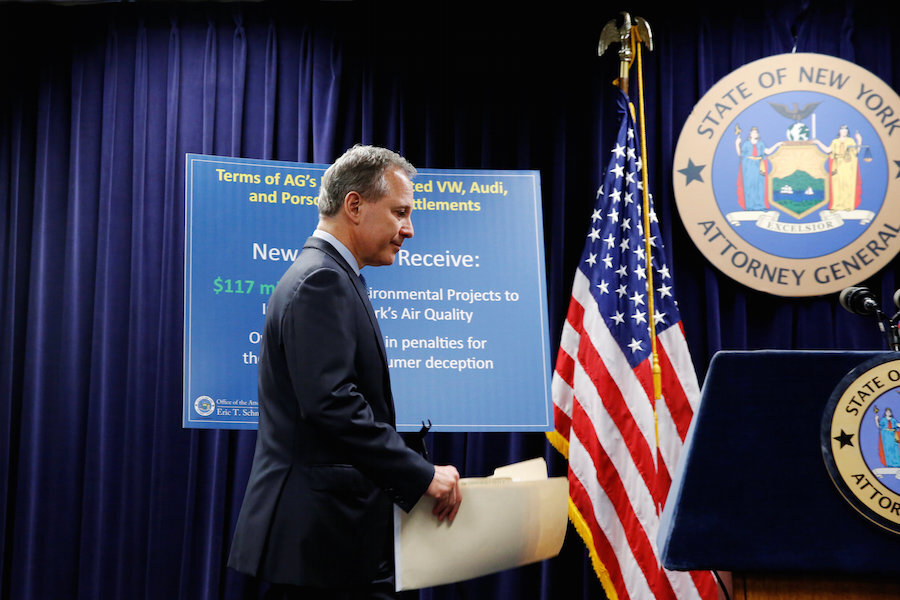VW reaches settlement with US regulators, but Dieselgate is far from over
Loading...
If you live in the U.S. and own an Audi or VW 2.0-liter diesel, today's your day--the day you learn how much Volkswagen plans to compensate you for buying an illegally rigged vehicle.
It's also the day that you learn whether Volkswagen will buy back your car because you're too disgusted by the whole Dieselgate scandal to drive it anymore.
And of course, it's the day when we all learn how much Volkswagen plans to shell out in fines to the Environmental Protection Agency (for cheating on emissions tests), the California Air Resources Board (for the same reason), and the Federal Trade Commission (for deceiving consumers who thought they were buying "clean diesel" vehicles).
The entire settlement package will cost the German automaker up to 15.3 billion in the United States. Attorneys for owners and the federal government say that the total breaks down like this:
$10.033 billion for owners of 2.0-liter diesels
This sum will be used to buy back vehicles from owners or account forlease terminations from lessees. Buybacks will be based on the "clean trade-in" value of cars--that is, the value they would've had before Dieselgate became front-page news. Buybacks are likely to begin in October.
The sum will also be applied to repairs of 2.0-liter diesels that owners choose to keep, if and when a repair plan is approved by the EPA and CARB. Hopefully, that'll happen by November, but if a fix is never approved, owners will still have the option to sell their vehicles back to Volkswagen for the "clean trade-in" price.
This sum will also be used to issue compensation to Audi and VW owners. They'll receive that compensation no matter whether they choose to sell their vehicles back to Volkswagen or to keep them and wait for a fix. The attorneys explain:
"The amount [of compensation] is the same whether one participates in the Buyback or modification program. The settlement agreement includes a formula for how this cash payment is determined. For example, most owners who purchased a 2.0-liter vehicle before September 18, 2015 will be eligible for a payment ranging from $5,100 to approximately $10,000 per vehicle. This cash is to be paid on top of the September 2015 Clean Trade-in value for class members participating in the Buyback Program."
$2.7 billion for environmental remediation programs
In other words, Volkswagen will need to undo the environmental damage caused by its "clean diesel" vehicles, which, as we now know, pumped up to 40 times the legal limit of pollutants into the air.
$2 billion for zero-emissions technology
Volkswagen's CEO Matthias Muller has promised to produce over 30 electrified vehicles by the year 2025. That's a tall order, given that the VW brand can't even manage to sell a hybrid in the U.S., but at least Volkswagen now has some funds for research and development.
$600 million to settle other lawsuits
These suits have been filed on behalf of 44 states, the District of Columbia, and Puerto Rico.
More to come
Today's announcement is an important first step--for Volkswagen, for consumers, and of course, for VW and Audi dealers, who'd really like to put all this mishegas behind them. But the damaging headlines and the hefty payouts for Volkswagen aren't over yet.
In the U.S., there are also 85,000 Audi, Porsche, and VW 3.0-liter diesels equipped with defeat devices. Today's deal does nothing for owners and lessees of those vehicles. (Back in January, Volkswagen submitted plans to repair those models and compensate owners, but CARB and the EPA gave the proposal a giant thumbs-down.)
Also, according to the terms of today's agreement, Volkswagen has to fix or buy back 85 percent of its 2.0-liter diesels in the U.S. by June of 2019. If it doesn't, the automaker will be fined $100 million for every percentage point below 85 that it's completed.
And let's not forget, this agreement only covers 475,000 vehicles (formerly estimated at 482,000 vehicles) in the U.S. There are still 10.5 million diesels in other countries affected by the Dieselgate scandal, and you can bet that some of those governments will be expecting big payouts, too.
Note: for purposes of clarity, "Volkswagen" has been used to refer to the Volkswagen Group parent company, while "VW" has been used to refer to the company's popular mass-market brand of automobiles.







